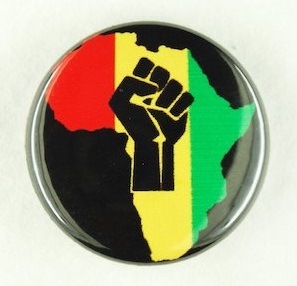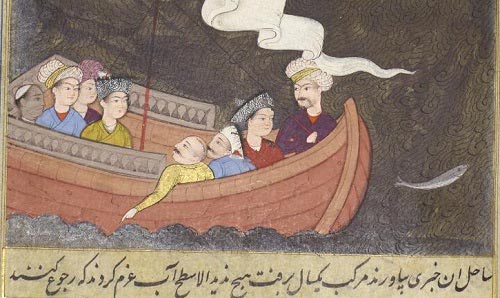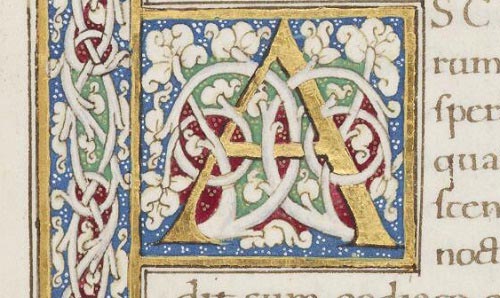
Africa Collections
The collections document written culture in Northern Africa in a variety of formats, languages and scripts, from the ancient world to the 19th century.

There are large and important collections of papyri from Egypt, a significant collection of Ethiopian manuscripts, and manuscripts in Arabic from Northern and Western Africa. These provide good coverage of Judaism, Christianity and Islam in the region and throw light on the social, commercial, political, religious and intellectual life of Egypt from the Ancient World to the 19th century.
The Ahmed Iqbal Ullah RACE Centre holds unique collections related to African diaspora communities in Manchester and to race relations in the UK from the 20th century onwards. The Library also has substantial holdings of archives, books, maps and photographs relating to British exploitation of African people and natural resources, from the 17th-20th centuries. There are records of slavery in the Caribbean as well as of the anti-slavery movement, British industrial and military interests in Africa, as well as anthropological and ethnographic documents.
Ancient World
The Library holds an important collection of Egyptian papyri and ostraca in hieroglyphic, hieratic and demotic scripts, dating from 14th century BCE-2nd century CE. Some are funerary texts, including the Book of the Dead, but the majority are documentary sources revealing details about the lives of individuals and communities in Egypt, especially in the area around Hermopolis (now El Ashmunein). Other substantial papyri collections preserve texts written in Greek, Coptic and Arabic, with smaller numbers in Latin and Hebrew. The Graeco-Roman papyri are especially significant and contain important religious, literary and documentary texts.
Judaism, Christianity and Islam
The Rylands holds some of the earliest written evidence of Judaism in Egypt. The famous ‘Deuteronomy fragments’ come from a second century BCE papyrus roll written in Greek. The Rylands Cairo Genizah Collection contains over ten thousand fragments on parchment and paper relating to Jewish faith, culture and history from the 10th-19th centuries CE. The Hebrew manuscripts include copies made by Sephardic Jews in Northern Africa, while the print collections include early editions of books by North African authors and examples of Hebrew printing in North and South Africa.
Early Christian texts are an important feature of the Greek papyrus collection (largely from Egypt), which includes one of the earliest known fragments of the New Testament and a substantial number of other important canonical and non-canonical texts. A collection of 46 manuscripts written in the Ge’ez language, including biblical and liturgical texts, stories of saints and martyrs, and magical scrolls, reflect Christianity in Ethiopia between 1590 and the early 19th century. The wider collections include Bibles and Christian texts in many African languages, most of which were printed in the 19th and 20th centuries. Some were the first books printed in these languages. The earliest were printed in Italy, including the Psalms in Ge’ez (1513) and an Arabic devotional work titled Kitāb ṣalāt al-sawā'ī (1514). Archives of Protestant Nonconformist missionary organisations, especially the Christian Brethren Archive, comprise the largest and most important collections related to Christianity in Africa. The Methodist Archives include papers of Wesleyan Methodist missionaries Thomas William Blanshard and Richard Amos, printed reports of Foreign Missions, and references to missions in Africa in the correspondence of Charles Wesley and in the Fletcher-Tooth Collection.
The history of Islam in Africa is an important feature of the Arabic manuscripts. Qur’ānic manuscripts include a monumental Mamluk Qur’ān from 14th-century Egypt, weighing in at 52 kilos, and a volume written in gold in a Maghribi script, from North Africa or Al-Andalus. Arabic manuscripts associated with Egypt, Algeria and Morocco include documents relating to Moroccan society before the French Protectorate. West African manuscripts include Maliki legal texts, prayers, and amulets, providing insights into 19th-century religious, literary and political life. Some West African manuscripts survive in the traditional form of loose sheets kept in a leather bag, and include texts in Hausa as well as Arabic. Some relate to the Fulani wars, including copies of Hausa poems by the revolutionary Usman dan Fodio (1754-1817) and letters written to Aliyu Babba, the last Emir of Kano (1894-1903).
African diaspora
The RACE Centre contains a wide range of material relating to African communities in the United Kingdom from the 20th century onwards. People of African heritage have created many of these collections, and the Centre continues to support diverse African communities to explore, document and archive their experiences and histories.
Oral histories - the voices of real people - are a significant and extremely rich part of the RACE Centre collections. Exploring Our Roots, for example, includes life story interviews with people of African and Caribbean heritage living in Greater Manchester, and recordings of Kurdish, Afghan and Somali refugees talking about their lives before, during and after seeking asylum in the UK. There are also interviews with members of the Salford Yemeni community and interviews drawing on the oral histories and cultural traditions of the Congolese community living in Manchester.
Strengths of the RACE Centre library collection include the US Civil Rights movement, UK race policy and practice, education and arts. Archives in the RACE Centre cover the history of BME communities in Manchester and race relations in the UK, especially from the 1960s onwards. Collections include the Carnival collection, Papers of the Commission for Racial Equality, the Institute of Race Relations collection and archives related to the Pan-African Congress held in Manchester in 1945 and its 50th anniversary in 1995.
White supremacy and exploitation
As a historical resource, the Eurocentric collections described below reflect the racism of the era in which they were created, and contain material that can be offensive, violent and oppressive. The University of Manchester rejects the practices and beliefs represented in these collections, but we are committed to providing access to them as evidence of the inequalities and attitudes of the time. We encourage people to use these collections in ways that challenge continuing inequalities.
The bondage and forced labour of African people and their descendants enslaved on plantations in the West Indies is documented in the papers of Cheshire-based plantation owners (Stapleton and Brooke of Mere). The Rylands holds extensive records of the British anti-slavery movement, including the Raymond English Anti-Slavery Collection and the Rawson/Wilson Anti-Slavery Papers, which contains the original manuscripts of verse and prose contributions printed in The Bow in the Cloud (1834). The Library also holds published works by or about formerly enslaved people, such as the Igbo writer and abolitionist Olaudah Equiano (c.1745-1797) and the abolitionist and autobiographer Mary Prince (born c.1788), while the Foreign and Commonwealth Office Pamphlet Collection contains rare and important printed material related to slavery and the anti-slavery movement.
The University of Manchester map collection contains many maps relating to Africa, including road and travel atlases and flat sheet maps from the 18th century to the present day. Maps of Africa in the nineteenth and twentieth centuries are particularly well represented in the collections of the Manchester Geographical Society (MGS). As the organisation was founded in 1885, the maps of the MGS were primarily amassed during and after the ‘race for Africa’ and provide evidence of imperialistic attitudes and aspirations. Although held by the MGS for educational purposes, many of these maps were instruments of imperial power produced for military, missionary and commercial purposes that enabled the exploitation of people and resources and the violent suppression of native peoples.
Papers of Dr Charles Tilstone Beke (1800-1874) document negotiations between the British Government and Ethiopian Emperor Tewodros II between 1864 and 1868. When the negotiations failed, the British army destroyed the Emperor’s fortress, library and treasury at Maqdala or Magdala (now Amba Mariam), pillaging regalia, sacred relics and manuscripts. Five Ethiopian manuscripts looted at Maqdala are held at the Rylands.
The Tanks Group Archive is a major source for studies of industrial history, colonial exploitation and development in Central and East Africa. The Tanks Group (Tanganyika Concessions Ltd) was a holding company for several railway and mining concerns that extracted and transported minerals from Northern Rhodesia and the Congo Free State. The Tanks Archive contains extensive documentary and photographic evidence covering the Group’s activities in the first half of the 20th century. The Library also holds a volume containing technical details and photographs of rail locomotives manufactured by the firm Nasmyth, Wilson & Co. in the 1920s and ’30s, most of which were sold to colonial customers in India, Malaya, Africa and the West Indies.
The Guardian Archive is an important source for British military involvement in Africa in the 19th-20th centuries. Correspondence and diaries of British people involved in or campaigning against the Boer War are preserved in the Bromley Davenport Muniments and the archive of the Manchester Transvaal Peace Committee. Within the Ashworth Cross Family Papers are letters, albums and diaries of Guy Kynaston Cross (1884-1961), who served with the British Army, and of his second wife, Florence Dupen, an ambulance driver, documenting their military service and travels in South Africa, India, Sri Lanka, Australia and Germany. For the British Army North Africa Campaign in the Second World War see the Papers of Field Marshal Auchinleck (1884-1981), a British Army commander, and the Dorman O’Gowan papers.
The collections contain papers, archives and books relating to the study of Africa, especially of Ancient Egypt. These include the professional and personal papers of Dr Eve Reymond (1923-1986) and the archive of Manchester Egyptian and Oriental Society (c.1906-1965). The rare book collections include early editions of David Roberts’s Egypt and Nubia (1846-49) and The Holy Land (1855) and Francis Frith’s Egypt and Palestine (1858-63) – one of the first books illustrated with pasted-in photographs. The photographs and papers of the collector curator, and ethnographer, Henry Ling Roth (1855-1925) reflect his wide-ranging interests in the archaeology and material culture of the indigenous peoples of Australia, Africa, the Caribbean and South East Asia. The papers of Max Gluckman (1911-1975) include correspondence about anthropological perspectives on Africa.
List of collections
Physical collections
- Arabic Manuscripts
- Auchinleck Papers
- Ashworth Cross Family Papers
- Bromley Davenport Muniments
- Brooke of Mere Muniments
- Christian Brethren Archive
- Crawford Collection
- Egyptian Manuscripts
- English Manuscripts
- Raymond English Anti-Slavery Collection
- Ethiopian Manuscripts
- Foreign and Commonwealth Office Pamphlet Collection
- Rylands Cairo Genizah Collection
- Max Gluckman Papers
- Greek Manuscripts
- Guardian (formerly Manchester Guardian) Archive
- Hebrew Manuscripts
- Manchester Egyptian and Oriental Society Archive
- Manchester Geographical Society Collection
- Dorman O’Gowan Papers
- RACE Centre Archives
- RACE Centre Library
- RACE Centre Oral Histories
- Rawson/Wilson Anti-Slavery Papers
- Eve Reymond Papers
- Henry Ling Roth Papers
- Stapleton Manuscripts
- Tanks Group Archive
- Women's Suffrage Movement Archives
Digital collections
- Ahmed Iqbal Ullah Race Relations Collection in Library Digital Collections
- Bow in the Cloud in Manchester Digital Collections
- Genizah Collection in Library Digital Collections
- Guardian Collection in Library Digital Collections
- Hebrew Manuscripts in Manchester Digital Collections
- Maps Collection in Library Digital Collections
- Non-conformist Collection in Library Digital Collections
- Papyri Collection in Library Digital Collections
Further information
Related subject pages
- Ahmed Iqbal Ullah RACE Centre Collections
- Christian Brethren Archive
- Classics and Ancient History Collections
- Collections for the History of the Book
- Methodist Collections
- Map Collections, Travel and Discovery
- Middle East Collections
- Military, Colonial and International History Collections
- Religion and Theology Collections
Rylands blog posts
- A Tribute To Clare Hollingworth
- Albert Cartwright and the Anti-War Press during the Boer War
- Black History Month: Beyond October – A Journey of Discovery
- C.P. Scott and the Boer War on the 170th Anniversary of his Birth
- Manchester Geographical Society Map Project: Maps of Africa
- Magic lanterns and ‘magic’ imperialism
- Rediscovered: George Hugh Gough and Anglo-Egyptian War
- Stop the Tour: Two Protests One Ideal
- The Diary and Notebook of Dan Crawford, Brethren Missionary in Africa

Exploring subject areas
An overview of our Special Collections, including information about the background and history of our holdings.

Special Collections A-Z
Explore the Special Collections through the collection names and descriptions using our searchable A-Z tool.
